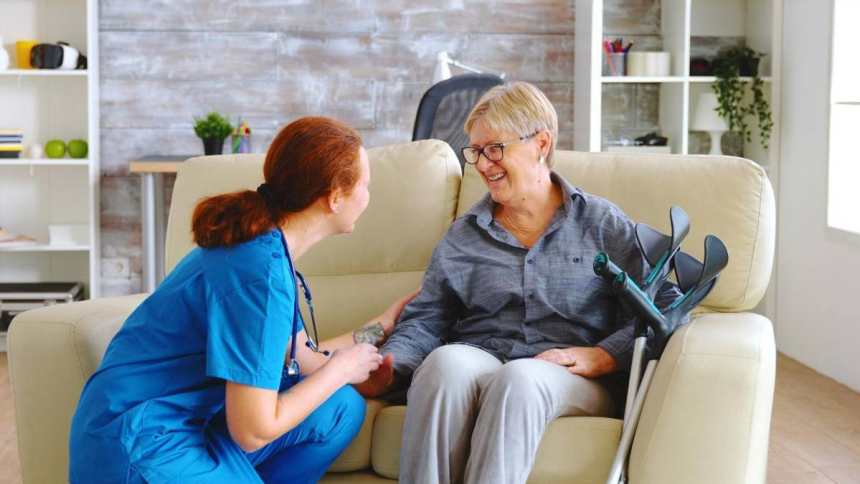Recovering from a brain injury is often a long and unpredictable journey. Whether caused by trauma, stroke, or a medical condition, brain injuries can affect memory, mobility, emotions, and the ability to manage everyday tasks, for both the person recovering and their loved ones, the process can be physically and emotionally overwhelming.
In the past, most recovery happened in hospitals or rehabilitation centers. But today, more families are turning to home care as a safer, more supportive option, with the right team and environment, home care can make recovery more comfortable, more effective, and even faster in some cases.
Let’s explore how home care works, and why it may be the key to a smoother recovery.
The Benefits of Home Care for Brain Injury Recovery
A. Individualized Care and Attention
No two brain injuries are the same, and recovery isn’t one-size-fits-all. That’s why home care stands out: it’s built around the individual.
- Personalized care plans are designed to meet the patient’s unique needs, whether they need help with mobility, memory, or managing their mood.
- Caregivers can offer round-the-clock support, giving families peace of mind that help is always available.
- With consistent monitoring, care teams can adjust the plan as recovery progresses, responding to improvements or new challenges in real time.
This flexible, patient-centered approach makes a real difference, especially during the early, more fragile stages of healing.
B. A Familiar and Comfortable Environment
Healing at home brings emotional comfort that clinical settings often can’t provide; for individuals recovering from a brain injury, this sense of familiarity can be powerful.
- Being in a known environment helps reduce anxiety and confusion, which is especially helpful for those with memory or cognitive challenges.
- Surroundings that spark positive emotions, family photos, a favorite chair, a beloved pet can support emotional recovery.
- Patients often experience a greater sense of independence and control, which boosts motivation and dignity during the healing process.
When the home is calm and supportive, the recovery journey feels less like a medical process and more like returning to life.
C. Enhanced Safety Measures
Safety is a top concern after a brain injury. Many patients are at increased risk of falls, medication errors, or disorientation; especially early in recovery.
Home care services proactively address these risks:
- Caregivers assist with daily tasks, ensuring safety during potentially hazardous activities like showering or climbing stairs.
- They manage medications with precision, avoiding missed doses or harmful interactions.
- With home modifications, such as grab bars, ramps, and non-slip mats, the environment is adapted to reduce risk of injury.
These small changes make a big impact in preserving health and peace of mind.
Types of Home Care Services That Support Brain Injury Recovery
A. Skilled Nursing Care
For those with more complex medical needs, skilled nurses provide essential clinical services at home:
- Wound care, injections, and medication administration
- Rehabilitation therapies like physical, occupational, or speech therapy
- Continuous monitoring of vital signs and symptoms for early detection of complications
Having these services delivered at home reduces the stress of constant travel and hospital visits.
B. Personal Care Assistance
Daily tasks can become frustrating or dangerous for those recovering from a brain injury. Personal care aides support independence while keeping patients safe:
- Assistance with hygiene, dressing, and grooming
- Help with cooking, eating, and light housekeeping
- Mobility support and transportation to medical appointments
These services ensure a safe routine and consistent self-care, critical for long-term progress.
C. Emotional Support and Companionship
The emotional toll of a brain injury can be just as significant as the physical. Home care teams also provide:
- Social interaction to prevent loneliness and isolation
- Counseling or emotional support for both patients and their families
- Encouragement that builds confidence and keeps recovery goals in sight
This human connection often becomes a lifeline during long recoveries.
Where Recovery Feels Easier: Cities That Support Healing
Location can influence recovery more than many people realize. Cities with clean air, access to nature, and strong home care services provide a more healing-friendly atmosphere.
- New York stands out as a hub for home care services, offering a wide range of specialized providers who understand the complexity of brain injury recovery. With access to both medical excellence and diverse support programs, families can find TBI home care services in New York that match their needs.
- Portland, with its green spaces and relaxed pace, offers a calming environment ideal for reducing stress and promoting emotional wellness.
- Cities like Minneapolis, Seattle, and San Diego also provide excellent access to nature, supportive infrastructure, and high-quality in-home care networks.
When choosing a place for recovery, consider both the services available and the healing power of the surroundings.
Conclusion: A Safer, More Supportive Path to Healing
Brain injury recovery is never easy, but it doesn’t have to happen alone or in a hospital room. Home care brings personalized support, emotional relief, and daily safety right to the doorstep.
With the right team and setting, patients can heal at their own pace, in comfort, with dignity, and surrounded by the people and places that matter most.
Lynn Martelli is an editor at Readability. She received her MFA in Creative Writing from Antioch University and has worked as an editor for over 10 years. Lynn has edited a wide variety of books, including fiction, non-fiction, memoirs, and more. In her free time, Lynn enjoys reading, writing, and spending time with her family and friends.















